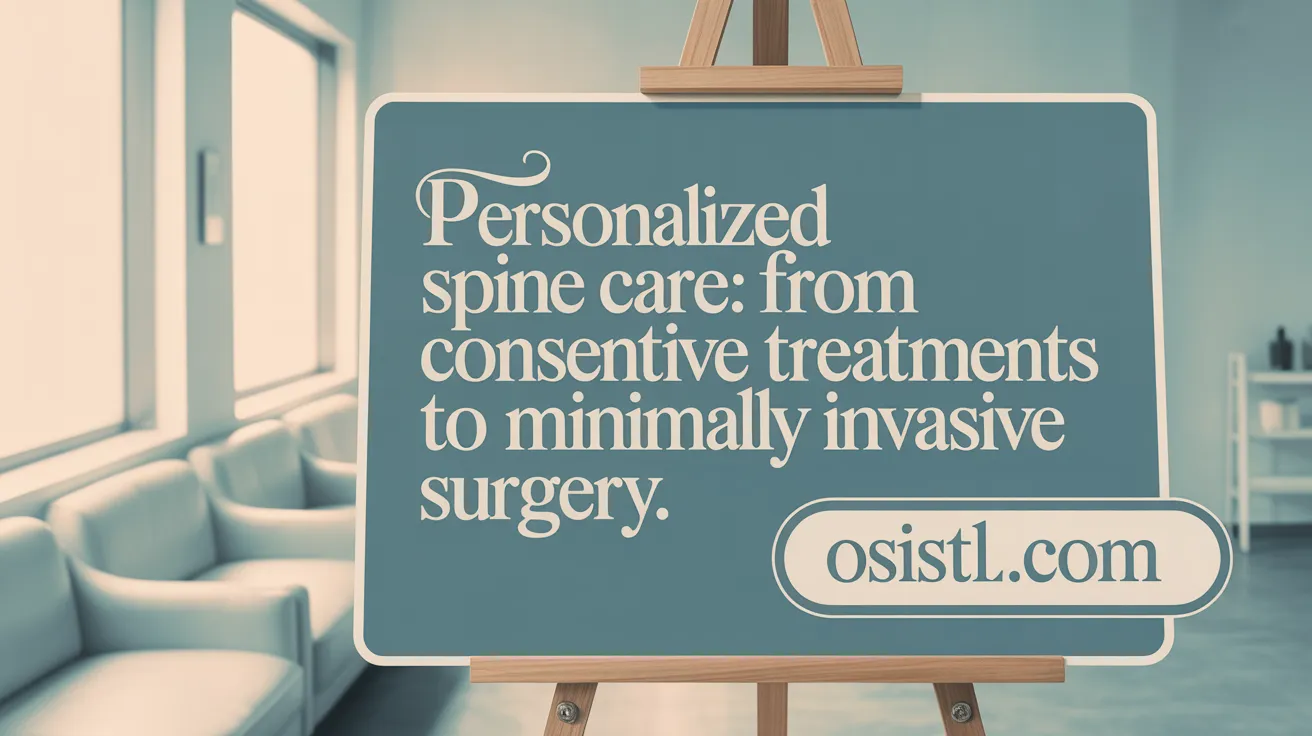Understanding the Urgency of Spine Injuries Post-Car Accident
Importance of Immediate Medical Evaluation After Car Accidents
If you've been in a car accident, getting prompt medical attention is essential—even if you're not feeling severe pain right away. Injuries like whiplash, herniated discs, or spinal fractures may develop symptoms hours or days later. Early diagnosis with tests like X-rays or MRI helps prevent chronic pain and long-term disabilities.
Common Spinal Injuries from Car Accidents
Car accidents frequently cause a variety of spinal injuries:
- Whiplash: Rapid neck movements that strain ligaments and muscles.
- Herniated Discs: Soft disc material pushes out, pressing on nerves.
- Spinal Fractures: Ranging from cracks to severe breaks destabilizing the spine.
- Spinal Cord Injuries: Disruption in nerve signals, potentially causing paralysis.
- Compression Fractures: Vertebrae crushed under pressure, leading to pain.
Signs and Symptoms Requiring Emergency Care
Certain symptoms after an accident require immediate medical help—call 911 if you notice:
- Severe neck or back pain
- Numbness, tingling, or weakness in limbs
- Difficulty walking or controlling bladder/bowel
- Abnormal body positioning
- Loss of sensation or paralysis
To avoid worsening injury, do not move the person if spinal injury is suspected. Stabilize the neck and head and wait for professional help.
Recognizing these red flags and seeking urgent care can be life-saving and is the first crucial step toward recovery after a car accident.
Recognizing and Responding to Spine Injuries Immediately After a Collision

Initial first aid for suspected spinal injuries
If you suspect a spinal injury after a car accident, it is critical not to move the injured person. Moving them improperly can worsen the injury and lead to paralysis or other serious complications. Stabilize the neck and head by supporting them with rolled towels or sheets on both sides without allowing any movement. For detailed guidance on Spinal injury first aid.
When and how to call emergency services
Immediately call 911 or emergency medical services if there are any Signs of spinal injury. Emergency responders are trained to handle these cases safely and will immobilize the patient properly during transport. Learn more about Signs of spinal injury.
Risks of moving an injured person without professional help
Moving an individual with a suspected spinal injury without proper stabilization can result in further damage to the spinal cord. This may cause loss of sensation, muscle weakness, paralysis, or other long-term disabilities. Important information can be found on Emergency steps for spinal injury.
Typical signs indicating spinal trauma
Signs that suggest a spinal injury include severe neck or back pain, numbness, tingling, muscle weakness, paralysis, loss of bladder or bowel control, abnormal body positioning, and changes in consciousness following head trauma. Recognizing these signs early and securing immediate medical help is essential to prevent complications. See Recognizing signs of spinal injury.
Promptly following these steps can protect the injured person and improve their chances for a successful recovery after a car accident.
Comprehensive Diagnostic Evaluation and Early Intervention at Specialized Institutes

Role of Imaging Tests in Diagnosing Spine Injuries
Imaging plays a critical role in assessing back and neck injuries after car accidents. Tools such as X-rays for back injury, MRI for spinal assessment, and CT scans for trauma evaluation help detect fractures, herniated discs, ligament tears, and spinal cord damage. MRI offers detailed views of soft tissues, while CT and X-rays provide clarity on bone structure and alignment issues.
Importance of Early Diagnosis
Early and accurate diagnosis is essential to prevent injuries from worsening and to avoid chronic pain or permanent disabilities. Symptoms may be delayed or subtle initially, so thorough imaging and specialist evaluations help catch hidden injuries and guide timely treatment. This is why importance of early diagnosis for back pain is critical.
Diagnostic Capabilities at the Orthopedic Spine Institute of St. Louis
The Orthopedic Spine Institute of St. Louis provides on-site MRI and X-ray services, ensuring swift and precise injury assessments. This capability allows for prompt development of personalized back injury treatment plans that start conservatively and escalate to minimally invasive spine surgery if necessary.
Benefits of Multidisciplinary Assessment
Comprehensive care involves multiple specialties including orthopedic surgery, physical therapy, pain management, and rehabilitation. This multidisciplinary spine care team approach maximizes treatment effectiveness by considering all aspects of spinal injury, improving pain relief and functional recovery.
Treatment Strategies at the Orthopedic Spine Institute of St. Louis: Conserving Function and Minimizing Surgery

What conditions does the Orthopedic Spine Institute of St. Louis treat?
The Orthopedic Spine Institute of St. Louis manages a wide range of spinal conditions to provide comprehensive care for patients. They treat degenerative diseases such as herniated discs and spinal stenosis. Spinal deformities like scoliosis and kyphosis are also addressed, alongside complex cases involving spinal tumors, trauma, and fractures. Neck pain, sciatica, and nerve-related conditions are also within their scope. Care is personalized, targeting both pain relief and long-term spinal health.
What treatment approaches does the Orthopedic Spine Institute of St. Louis offer?
Treatment begins conservatively with non-invasive options like medications, physical therapy, bracing, manual therapy, massage, and acupuncture. These aim to restore mobility, manage pain, and improve function. Advanced diagnostics such as electromyography help tailor treatments specifically to nerve injuries.
When conservative care is insufficient, minimally invasive surgical procedures are offered. These include microdiscectomy procedure details, laminotomy, foraminotomy, and spinal fusion. These surgeries minimize tissue damage and blood loss, promoting quicker recovery and less post-operative pain.
How does the institute integrate patient care for effective recovery?
The Orthopedic Spine Institute employs a multidisciplinary team approach to ensure patients receive coordinated care. Personalized treatment plans guide recovery, with the patient actively involved at every stage. Rehabilitation and physical therapy are part of the care continuum, helping maintain function and prevent recurrence.
This integrated strategy optimizes outcomes by focusing on pain reduction, functional restoration, and a return to daily activities with minimal disruption.
Navigating Insurance and Accessing Care With Dr. David S. Raskas
How can a patient book an appointment with Dr. David S. Raskas?
Patients seeking expert spine care from Dr. Raskas Spine Care St. Louis can conveniently schedule appointments through multiple channels. The Orthopedic Spine Institute of St. Louis offers an online portal where patients can explore their spine conditions, review treatment options, and fill out secure forms ahead of time. For those preferring personal assistance, appointments can also be booked by phone or by visiting the clinic at 10435 Clayton Rd, Des Peres, MO.
Does the Orthopedic Spine Institute of St. Louis accept insurance?
Yes, the Institute accepts a wide range of insurance plans, including major providers like Blue Cross Blue Shield, Elevance, and United Healthcare. This insurance flexibility supports patient access to leading spine care without undue financial barriers. Patients are encouraged to confirm their coverage and inquire about co-pays, billing, or pre-authorizations prior to their appointment to ensure a smooth experience.
What to expect during your consultation
Your first visit with Dr. David S. Raskas, MD will focus on a thorough evaluation to understand your spine condition fully. This includes a detailed medical history review, physical examination, and possibly diagnostic imaging. Dr. Raskas emphasizes patient education, ensuring you understand your diagnosis and treatment options clearly. The goal is to develop a personalized treatment plan that aims to reduce pain and restore function using the least invasive method possible.
Importance of thorough diagnosis and patient education
Thorough diagnosis is the foundation of effective spine care. Dr. Raskas prioritizes this to tailor treatments specifically to your needs, improving outcomes and minimizing unnecessary interventions. Patient education plays a vital role in empowering individuals to participate actively in their recovery. At the Orthopedic Spine Institute of St. Louis, clear communication and shared decision-making are cornerstones to helping patients regain their quality of life efficiently and confidently.
Post-Accident Recovery: Best Practices and Long-Term Spine Health
Why Is Follow-Up Care Important After a Car Accident?
After a car accident, some spine injuries may not cause immediate pain or symptoms. Follow-up medical care is essential to monitor your condition over time. Early examination and ongoing evaluation help catch delayed symptoms and prevent chronic problems, such as persistent pain or reduced mobility. Regular check-ups allow healthcare providers to adjust treatment plans promptly, ensuring optimal healing.
How Can Physical Therapy and Conservative Care Help?
Physical therapy plays a vital role in spine injury recovery. It focuses on restoring movement, strengthening muscles, and reducing inflammation through targeted exercises and manual therapy. Rehabilitation methods at specialized clinics include chiropractic adjustments, physiotherapy modalities, and gentle rehabilitative exercises to stabilize the spine and promote healing.
Conservative care—using medications, bracing, rest, and physical therapy—often supports recovery without the need for surgery. These approaches reduce pain and improve function while minimizing risks associated with invasive procedures.
What Lifestyle Changes Support Long-Term Spine Health?
Post-injury, adopting spine-friendly habits is crucial. Maintaining a healthy weight reduces strain on your back.
Regular gentle movement and good posture aid tissue healing and prevent stiffness.
Strengthening core muscles supports spinal stability.
Stress management can help reduce muscle tension and improve overall well-being.
When Should You Seek Further Medical Evaluation?
Be alert to warning signs that indicate worsening or new spinal issues:
- Persistent or escalating pain
- Numbness or tingling in limbs
- Muscle weakness
- Headaches or stiffness
- Difficulty controlling bladder or bowel
- Abnormal body positioning
If any of these symptoms arise, contact your healthcare provider immediately for evaluation. Prompt assessment is key to preventing long-term damage and ensuring a successful recovery.
Take Action Early: Prioritize Spine Health After a Car Accident
Immediate Steps After a Car Accident
After a car accident, the most crucial step is to seek immediate medical attention. Symptoms such as severe back pain, numbness, or weakness demand urgent evaluation. Avoid moving the injured person to prevent further spinal damage.
Importance of Expert Orthopedic Spine Care
Specialized centers like the Orthopedic Spine Institute of St. Louis offer comprehensive diagnostics including on-site MRI and X-rays to accurately assess spinal injuries. They tailor treatment plans that range from conservative therapies to minimally invasive surgeries, ensuring a personalized approach that promotes optimal healing.
Why Early Treatment Matters
Timely and expert intervention not only alleviates pain but also helps prevent chronic complications and long-term disabilities. Don’t delay; consulting with a spine specialist ensures proper diagnosis and swift initiation of treatment, setting the foundation for a smoother, more effective recovery journey.
